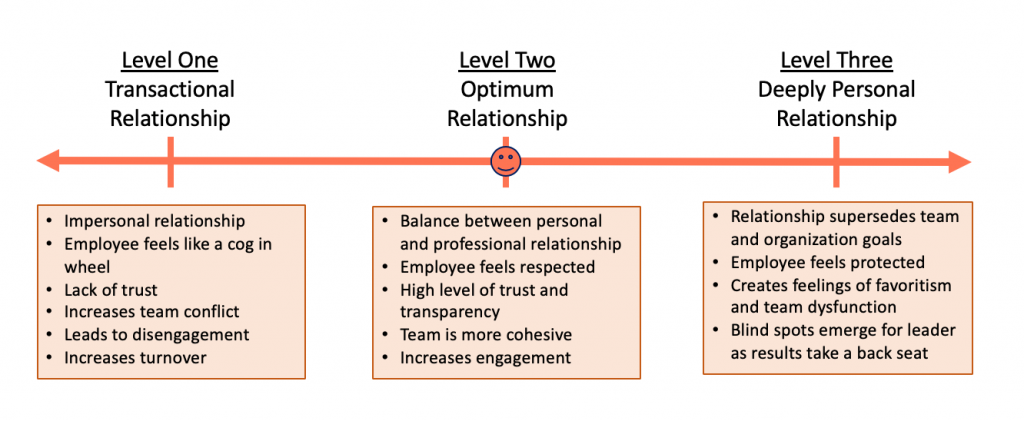
Gallup tells us that one’s relationship with their direct supervisor accounts for 70% of the employee’s overall engagement. Meanwhile, many managers struggle with creating the right relationship with their employees.
Sometimes the manager remains too distant, either because the manager has a personality conflict with the employee or they believe in a more impersonal workplace where people get paid, do their work and go home. Sometimes the manager is too close to the employee. Their desire to be friends with employees gets in the way of results, oftentimes leading to perceptions of favoritism and reducing team morale.
We have developed a continuum that helps supervisors better understand healthy relationships at work with their employees. The concept is based on Edgar Schein’s Process Consulting model.

The optimum relationship is a proper balance between having a personal and professional relationship with the employee. Being a boss who cares about the employee, but still being the boss who pushes for results is one of the more challenging aspects of leading people.
So how can supervisors and leaders strike the proper balance? Awareness of what the Optimum Relationship looks like is a good place to start. If you are a boss who tends toward Transactional Relationships, then some simple tips might help.
- Check in with employees daily on their workload, for example: "How are you doing today?" "Can I help with anything"
- Check in on a personal level with employees, for example: "How are your kids doing?" "How was your weekend?"
- Conduct personality profiles like Everything DiSC with the team to better understand communication styles and personality preferences.
- Share something personal about yourself – be a little vulnerable with employees, for example: "I lose sleep over the lofty goals the corporation has set for us." "I really struggle with this new computer system; can you show me how to use it better?"
If you tend toward Deeply Personal Relationships and need to dial it back, you will need to reset expectations with some employees that you have grown overly close to. For example, you can:
- Open up a conversation about results and expectations with the person you are close to, providing helpful and constructive feedback.
- Be mindful of the perception of favoritism (perception is reality) – for example, if you are going to lunch all the time with one person, change up the routine and ask someone else to go with you.
- Reset your priorities – make the results the most important thing and put people in positions to maximize the organization’s results for the long haul.
We love working with front-line managers and supervisors. Our coaching, training and tools are geared toward better relationships and improved results. Contact us today for a free consultation.